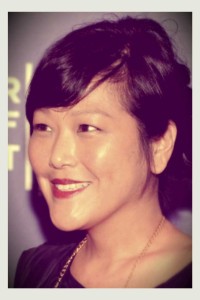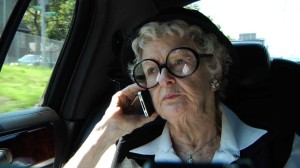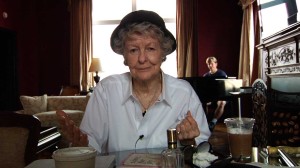
Chiemi Karasawa had no idea that a trip to Vartali Salon in Midtown Mahattan would lead to a year and a half filming the funny, poignant and irascible Elaine Stritch in a vérité documentary.
Elaine Stritch: Shoot Me follows the 87-year-old Tony and Emmy winner both onstage and off with candid reflections about her life and her struggles with aging, diabetes and alcoholism. From walks to the Theater District, to filming with Alec Baldwin on the set of 30Rock to rehearsing for her show A Little Night Music the film brings a multifaceted look at a complex, ornery woman who ultimately fascinates with her intense focus to perform.
Using a Panasonic HPX-170 camera with a single cameraman and a lavaliere microphone, Karasawa had to keep several cameramen on speed-dial to make sure that someone was always available to film. Stritch would often call at odd hours of the day or evening and say, “Chiem, it’s Elaine. I’m feeling kind of chatty. Do you want to come over and bring your camera?”
Shane Sigler, a cinematographer whose work includes Michael Moore’s Capitalism: A Love Story, Bruce Weber’s A Letter to True and Paul Morrissey’s News From Nowhere, shot about 60 percent of the film.

“I think there were actually about four or five guys that worked on the film, “ Sigler recalled. “We’re all freelance, and we all have to work on other jobs, so Chiemi had to struggle sometimes to find someone.”
“I knew that my cameramen could roll with her,” said Karasawa. “I picked cameramen who could handle her personality and not be swayed by it. The minute that she knows that she can intimidate you, she will. She likes people who are tough and will stand up to her and joke with her and take it and receive it.”
Karasawa used her background as a script supervisor, where she worked with such notable directors as Martin Scorsese, Stephen Frears, Jim Jarmusch, Larry Clark and Spike Jonze, when it came time to edit the film.
 “Script supervisor is a thankless job because not many people know what it is or what you have to do,” said Karasawa. “One of the main advantages is that you are with the director the entire time of the show and you’ve broken down the screenplay and you really get to know what the elements are in putting together a story and you know how it works. I think that served me very well in the documentary world. In the narrative world there is a certain recipe for putting something together, but in a documentary you are kind of hunting for the ingredients.”
“Script supervisor is a thankless job because not many people know what it is or what you have to do,” said Karasawa. “One of the main advantages is that you are with the director the entire time of the show and you’ve broken down the screenplay and you really get to know what the elements are in putting together a story and you know how it works. I think that served me very well in the documentary world. In the narrative world there is a certain recipe for putting something together, but in a documentary you are kind of hunting for the ingredients.”
Karasawa brought on principal editor Kjerstin Rossi about six months into the project. “We were shooting so much footage I wanted to make sure that it was logged. It was an asset to have someone so close to the footage and also she adored Elaine. She and I edited about 75 percent of the film in four-five months and then she went off to grad school and Pax Wassermann and I finished the film,” said Karasawa.
 “The structure of the film really came together once I interviewed Elaine in her hospital room, that really poignant interview that she gave me telling me ‘I’m 87-years-old. It’s time for me to think very seriously about going home… wherever that might be.’ Once I realized what a powerful and courageous gift it was for someone to have that epiphany and want to share, that moment became the pivotal moment and I recognized that would be a cornerstone in the film. Then I started working backwards from there, as if I knew it would be coming to that place. That informed the structure a lot,” said Karasawa.
“The structure of the film really came together once I interviewed Elaine in her hospital room, that really poignant interview that she gave me telling me ‘I’m 87-years-old. It’s time for me to think very seriously about going home… wherever that might be.’ Once I realized what a powerful and courageous gift it was for someone to have that epiphany and want to share, that moment became the pivotal moment and I recognized that would be a cornerstone in the film. Then I started working backwards from there, as if I knew it would be coming to that place. That informed the structure a lot,” said Karasawa.
Stritch was in the process of going through 30 years of photos to select some to be used at a studio being dedicated to her at the Stella Adler Studio. That element and the fact that she was going on tour provided a spine for the film.
“When someone is 87-years-old and mounting a one-woman show you have to capture that. And it was incredible because she was so imperfect and had to overcome such obstacles, her fear and her memory and people still ate it up because she brings you along on her journey and sucks you in. The audience was just hanging on her words,” said Karasawa.
In a culture that is almost ridiculously uncomfortable with the brutality of aging, Elaine Strich: Shoot Me is at times difficult to watch, but it is inspiring to watch a woman ravaged by the stress of aging and illness look into the camera and say with thoughtful courage, “There’s something exciting about being afraid.”
The film opened Feb. 21 in New York, and March 7 in Los Angeles.
)





